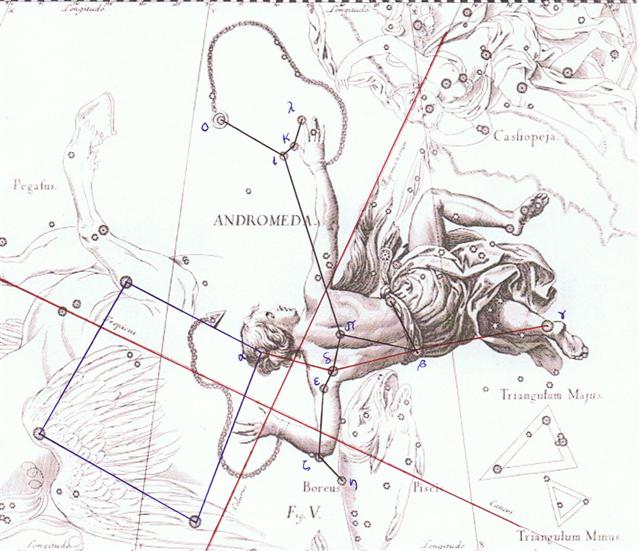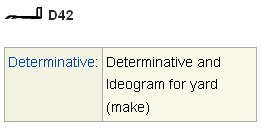The first Greek lettered star of Virgo (ω)
rose with the Sun at the same time as when Manus
Catenata (the Chained Hand of Andromeda,
ι) was close to the
Full Moon. A helpless hand hangs down at left in Ga5-1:
 |
 |
 |
 |
 |
|
Ga5-1 |
Ga5-2 |
Ga5-3 |
Ga5-4 |
Ga5-5 (115) |
|
*MAY 28 |
29 |
30 (150) |
31 |
*JUNE 1 |
|
JULY
10 |
11 |
12 (193) |
13 |
14 |
|
θ Crateris (175.0), ω Virginis (175.3), ι
Crateris (175.5) |
ο Hydrae (176.1) |
ζ Crateris, ξ Virginis (177.0), λ Muscae
(177.1), ν Virginis (177.2), μ Muscae
(177.8) |
Al Sarfah-10 /
Uttara Phalguni-12 |
Phekda, β Hydrae (179.3), η Crateris
(179.9)
Deneb Cygni
|
|
93 Leonis
(178.0),
DENEBOLA
(178.3), Alaraph (178.6) |
|
September 12 |
13 (256) |
14 |
15 |
16 |
|
'August 16 |
17 (229) |
18 |
19 |
20 |
| NAKSHATRA DATES: |
|
*NOVEMBER 27 |
28 |
29 (333) |
30 |
*DECEMBER 1 |
|
JANUARY
9 |
10 |
11 |
12 |
13 (378) |
|
λ Piscium
(358.0), Manus Catenata (358.1), Alrai,
θ Phoenicis (358.4), κ Andromedae (358.7) |
ω Aquarii
(359.2) |
ψ Andromedae
(360.1), σ Phoenicis (360.4) |
φ Pegasi (361.7) |
Dzaneb (362.4) |
|
π |
March 15 |
16 (440) |
17 |
18 (77) |
|
'February 15 |
16 |
17 (48) |
18 |
19 (415) |

|
Egyptian arm |
 |
Phoenician
yodh |
 |
Greek iota |
Ι (ι) |
|
Yodh is thought to have
originated with a pictograph of a
hand, ultimately deriving from
Proto-Semitic *yad-. It may
be related to the Egyptian
hieroglyphic of an arm. (Wikipedia)
 |
In rongorongo times Manus Catenata
rose with the Sun in March 14 (3-14), a
π-day.
 |
 |
 |
 |
|
Ga5-6 |
Ga5-7 |
Ga5-8 (118) |
Ga5-9 |
|
*JUNE 2 |
3 |
4 |
5 (156) |
|
JULY
15 |
16 |
17 (198) |
18 |
|
no star listed (180) |
π Virginis (181.0), θ Crucis (181.5) |
12h (182.6) |
Alchita,
Ma Wei (183.1),
Minkar
(183.7), ρ Centauri (183.9) |
|
ο Virginis (182.1), η Crucis (182.5) |
|
September 17
(260) |
18 |
19 |
20 |
|
'August
21 |
22 |
23 |
24 (236) |
| NAKSHATRA DATES: |
|
*DECEMBER 2 (336) |
3 |
4 |
5 |
|
JANUARY
14 |
15 (380) |
16 |
17 |
|
η Tucanae
(363.0), ψ Pegasi (363.1), 32 Piscium
(363.2), π Phoenicis (363.4), ε Tucanae
(363.6), τ Phoenicis (363.9) |
no star
listed (364) |
Al
Fargh al Thāni-25 |
Uttara Bhādrapadā-27
/
Wall-14 |
|
0h (365.25) |
|
Caph,
SIRRAH
(0.5), ε Phoenicis (0.8) |
ALGENIB PEGASI
(1.8) |
|
March 19 (78) |
20 |
21 (445) |
22 |
|
'February 20 |
21 |
22 (418) |
TERMINALIA (54) |
At Rei in Ga5-6 was
day 80 + 180 = 260 (September 17). And 182 days from 0h, i.e. 2
* 59 = 118 days from the beginning of the text, was
the position where 0h was close to the Full Moon.
At nakshatra Algenib Pegasi the Sun
had reached his Raven station, to the place of
thirst or lack of sweet water. It was
Terminalia ('February 23) and the last day of
the regular calendar year.
 |
 |
|
Ga5-10 |
Ga5-11
(121) |
|
*JUNE 6 (157) |
7 |
|
JULY
19 (200) |
20 |
|
Pálida (184.6), Megrez (184.9) |
Hasta-13 /
Chariot-28 |
|
GIENAH
(185.1), ε Muscae (185.2), ζ Crucis
(185.4), Zaniah (185.9) |
|
September
21 (264) |
EQUINOX |
|
'August
25 (237) |
26 |
| NAKSHATRA DATES: |
|
*DECEMBER 6 |
7 (341) |
|
JANUARY
18 |
19 (384) |
|
χ Pegasi
(2.1), θ Andromedae (2.7) |
σ
Andromedae (3.0), ζ Tucanae (3.5), ρ
Andromedae, π Tucanae (3.7) |
|
March
23 (82) |
24 (448) |
|
'February
24 (55) |
25 (421) |
Significantly Ga5-10 has a
Rogo figure at left, which we from a
preliminary assessment could understand as a
reference to Roman times,
when a new year ought to be due shortly after
Terminalia.
In rongorongo times 0h was
marked by Rogo in Gb6-26, where we either
can find heliacal Wezen (δ
Canis Majoris) or heliacal Sirrah (α
Andromedae), alternatively either
nakshatra Al Baldah (π
Sagittarii) or nakshatra Alchita (α
Corvi):
 |
 |
|
 |
 |
|
Gb6-25 |
Gb6-26 (408) |
Gb6-27 |
Gb6-28 (181) |
|
*MARCH 20 |
0h (187 - 107) |
22 |
23 |
|
MAY 2 |
3 (123) |
4 |
5 (490) |
|
7h (106.5) |
WEZEN (107.1),
τ Gemini (107.7), δ Monocerotis
(107.9) |
no star listed (108) |
λ Gemini (109.4),
WASAT
(109.8) |
|
no star listed (106) |
|
July 5 |
6 (187) |
7 |
8 |
|
'June 8 |
9 (160) |
10 |
11 |
|
NAKSHATRA DATES: |
|
*SEPTEMBER 19 |
20 (370 - 107) |
|
21 (264) |
EQUINOX |
|
NOVEMBER 1 |
2 |
3 |
4
(308) |
|
19h (289.2) |
Al Baldah-19 |
Aladfar (291.1), Nodus II
(291.5), ψ Sagittarii (291.6), θ
Lyrae (291.8) |
ω
Aquilae (292.1), ρ Sagittarii
(292.6), υ Sagittarii (292.7) |
|
λ
Aquilae (Ant.) (289.1), γ Cor.
Austr (289.3),
τ
Sagittarii (289.4), ι
Lyrae (289.5), δ Cor. Austr.
(289.8) |
AL BALDAH,
Alphekka Meridiana
(290.1), β Cor. Austr. (290.2) |
|
January 4 |
5 |
6 |
7 (372) |
|
'December 8 |
9 |
10 |
11 (345) |
 |
 |
|
 |
 |
|
Gb6-25 |
Gb6-26 (408) |
Gb6-27 |
Gb6-28 (181) |
|
*DECEMBER 3 (337) |
4
(80 + 365 - 107) |
5 |
6 |
|
JANUARY 15 |
16 (80 - 64) |
17 |
18 |
|
no star listed (364) |
Al
Fargh al Thāni-25 |
Uttara Bhādrapadā-27
/
Wall-14 |
χ Pegasi (2.1), θ Andromedae
(2.7) |
|
0h (365.25) |
|
Caph,
SIRRAH
(0.5), ε Phoenicis (0.8) |
ALGENIB
PEGASI
(1.8)
|
|
March 20 (444) |
0h |
22 |
23 (82) |
|
'February 21 |
22 |
TERMINALIA (54) |
24 (420) |
|
NAKSHATRA DATES: |
|
*JUNE 4 |
5 |
|
6 (157 = 264 - 107) |
7 |
|
JULY 17 |
18 |
19 (200 = 264 - 64) |
20 |
|
12h (182.6) |
Alchita,
Ma Wei (183.1),
Minkar
(183.7), ρ Centauri (183.9) |
Pálida (184.6), Megrez (184.9) |
Hasta-13 /
Chariot-28 |
|
ο
Virginis (182.1), η Crucis
(182.5) |
GIENAH
(185.1), ε Muscae (185.2), ζ
Crucis (185.4), Zaniah (185.9) |
|
September 19 |
20 |
21 (264) |
EQUINOX |
|
'August
23 |
24 (236) |
25 |
26 |
Judging from the Greek letters,
we should prefer the reading with Sirrah and
Alchita because they are
α stars.
I
regard this conclusion as a good hypothesis.
|











